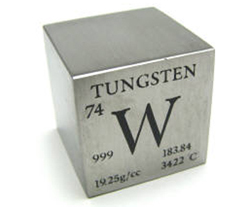Largely known as a popular material for wedding bands, it is a little-known and under-reported fact that tungsten is one of the hottest commodities these days.
While U.S. government agencies are miles away from speaking with one voice on the issue of critical minerals and metals, at least one agency, the Department of Commerce, has taken note of the strategic importance of tungsten and related issues in recent years. Here are a few points taken from its “Analysis of Tungsten,” contained in Appendix E of the Department of Defense’s 2009 Reconfiguration of the National Stockpile Report to Congress:
· Operation of the only tungsten mine in the U.S. was suspended in 1995 because of depressed prices, largely owed to high levels of production and exports by China.
· U.S. manufacturers get raw materials from concentrate imports and tungsten-bearing scrap as well as drawdown of National Defense Stockpile stocks of concentrate and powder.
· Tungsten ore and concentrate imports came mainly from Bolivia and Portugal between 1996 and 2007, Russia and Kazakhstan until 2000, Canada since 2002. Imports from China occurred between 2000 and 2003.
· For import of tungstates (produced from concentrate and undergoing chemical processing to yield metallic tungsten products), China has been main source.
· China has about two-thirds of global tungsten reserves, with government controlling production through ownership and regulation.
· China has increased its share of global concentrate production from 75% in 1995 to 85% in 2007, and is responsible for almost all of the 130% increase in global ore and concentrate output between 1995 and 2007.
Concluding, the report warns of consequences of China’ restrictive export policies, and states that:
Heavy reliance on imported material makes consuming industries vulnerable to fluctuations in the world price and availability of such inputs. China, for example, is a major producer of many of the materials for which the United States is heavily import reliant. (…)
With the increases in world demand for many materials, such policies, if widely adopted, could result in severe distortions of global markets and a difficulty for U.S. manufacturers to obtain raw material inputs in a timely and cost competitive manner.
That was three years ago. Unfortunately, policy makers on Capitol Hill are only now – and only slowly – realizing the scope of this problem. Here’s to hoping they’ll come up with something that isn’t too little, too late.






